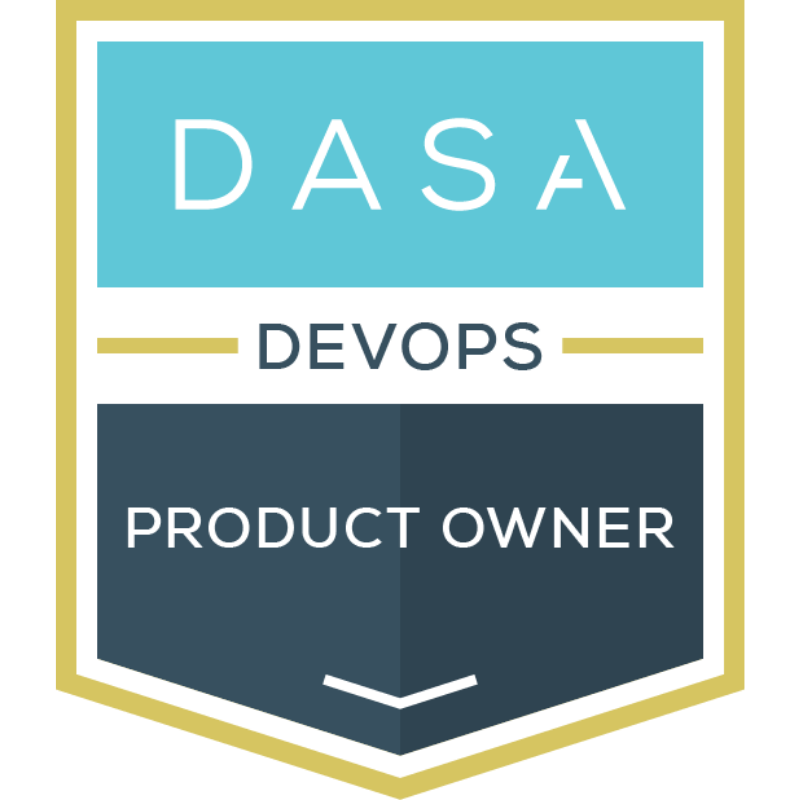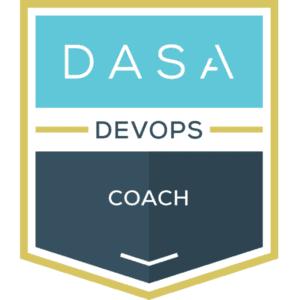Description
The DASA DevOps Product Owner Certification extends Agile Product Owner programs and deals with the extended set of requirements that the Product Owner faces when teams start to take on both Dev and Ops responsibilities. The program covers Agile and Scrum concepts and capabilities but in context of DevOps. As a result, this program is ideal for new and aspiring Product Owners and exciting for experienced Product Owners who are keen to understand how their role is evolving as a result of DevOps.
Like all other hyper-growth trends in the IT industry, the adoption of DevOps is not immune to potential misunderstandings and misconceptions. Besides relevant tooling and technology, DevOps predominantly entails a cultural shift towards a new mindset, behaviors, a new organization, and a new way of working.
The DASA DevOps Product Owner program is designed to prepare professionals for working as an effective Product Owner. During this intense, activity-based course you become familiar with the characteristics and traits of a successful DevOps Product Owner, learn about DASA’s competence model and apply the DASA DevOps Competence Model in teams and organizations.
Audience:
The DASA DevOps Product Owner course is primarily aimed at:
- Existing Product Owners without certification
- Business Project Managers
- Business Executives
- Business Managers
- Business Information Managers
- Business Analysts
- Operations Managers
- Enterprise Architects
Learning Objectives:
When you have acquired the required knowledge from this DevOps certification program, you will be able to:
- Understand the concepts of Agile and Scrum.
- Understand the Scrum framework including roles, events, the importance of backlog and the definition of done.
- Understand the role of Product Owner.
- Discuss the role and characteristics of the DevOps team.
- Explain the main competencies of the Product Owner.
- Describe what a Product Owner does in practice.
- Explain the Product Owner’s work.
- Discuss the importance of delivering value.
- Identify the Product Vision techniques.
- Discuss how to engage and influence stakeholders to maximize value.
- Outline various Agile estimation techniques used by Product Owners.
- Explain the role of Product Owner in managing Product Backlog.
- Discuss few challenging situations of a Product Owner.
Prerequisites:
Basic familiarity with Agile, Scrum, and DevOps framework is beneficial but not required for the completion of this course.
Course Outline:
Module 0: Program Overview
- Let’s Get to Know Each Other
- Course Overview
- Course Objectives
- Course Agenda
- Course Book
- Activities/Exercises
- Exams
- Questions and Answers
- Module Summary
Module 1: Context of the Product Owner
- Module Objectives
- Module Topics
- Product Owner
- Agile Introduction
- Scrum Overview
- Relationship Between Agile, Lean, and DevOps
- Module Summary
- Module End Questions
Module 2: The Role of the Product Owner
- Module Objectives
- Module Topics
- Role of the Product Owner
- Competencies of the Product Owner
- Product Owner in Practice
- Module Summary
- Module End Questions
Module 3: Agile Planning and Estimation
- Module Objectives
- Overview of the Product Owner’s Work
- Module Topics
- Value of the Product
- Envisioning the Product
- Decomposing the Vision
- Module Summary
- Module End Questions
Module 4: Maximizing Value
- Module Objectives
- Overview of the Product Owner’s Work
- Module Topics
- Engaging Stakeholders
- Influencing Stakeholders
- Module Summary
- Module End Questions
Module 5: Translating Value
- Module Objectives
- Overview of the Product Owner’s Work
- Module Topics
- Backlog
- Estimating Work
- Module Summary
- Module End Questions
Module 6: Delivering Value
- Module Objectives
- Overview of the Product Owner’s Work
- Module Topics
- Monitoring Progress
- Scaling Delivery
- Challenging Situations for a Product Owner
- Module Summary
- Module End Questions
Certification:
APMG delivers the DASA DevOps Product Owner certification exam, and participants receive a voucher for the exam on completing the course. The certification never expires.
Exam Information
| Delivery | Online |
| Format | Closed Book |
| Proctoring | Web Proctored |
| Duration | 60 Minutes (Additional 15 minutes for non-native English speakers) |
| # of Questions | 40 Simple Multiple Choice Questions (MCQs) |
| Pass Grade | 65% |






